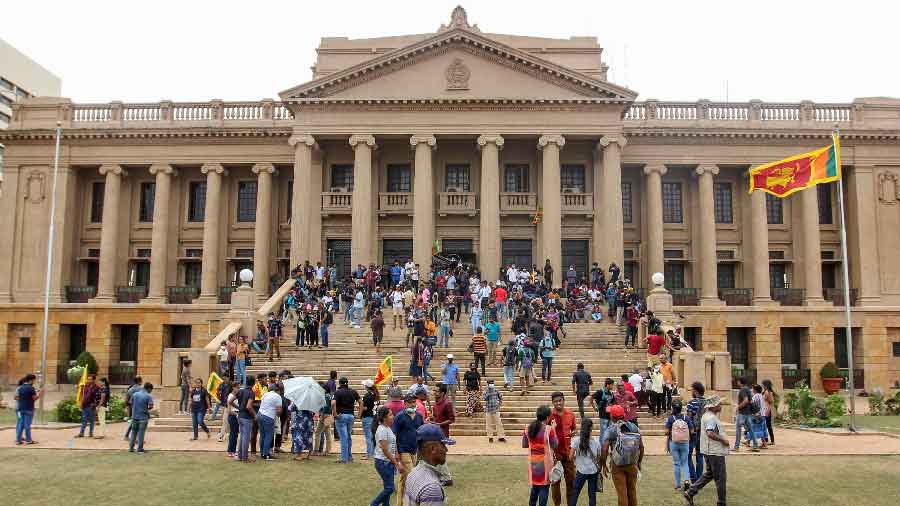In one corner of Sri Lanka’s capital, the protest movement that forced out the island nation’s powerful political dynasty over the country’s financial ruin continued as it has for months. Speeches and music blared from the main stage, while protesters strategised in tents dotting the scenic seaside.
In another corner, tempers flared. A large number of protesters clashed with security forces overnight, seizing the weapons of at least two soldiers, as they tried to force their way into the parliament, the focus of what appears to be a protracted political crisis. Activists on Thursday were struggling to keep things calm and ensure that a mass citizens’ movement does not help tip a country still grappling with the legacy of a decades-long civil war into outright anarchy.
Over the three months of protest, they have doggedly protected their reputation as a peaceful movement. But the political elite’s infighting over the vacuum of power left by the fleeing of President Gotabaya Rajapaksa now tests their patience. In an effort to reduce tensions, protest organisers on Thursday announced that they were pulling out of most government buildings that they had occupied, including the presidential mansion.
They have taken care to keep the historic buildings intact, assigning volunteers to clean up after the hordes of visitors, discouraging rowdy youngsters from climbing the mango trees in the garden, or damaging the antique furniture. “We are moving out of the occupied buildings because we want to preserve these places, and we don’t want people to vandalise these places, nor do we want the state or other actors using vandalism as a reason to vilify us and the movement,” said Buwanaka Perera, an organiser of the protest camp that has operated for more than three months in an oceanside park.
“So it’s better to hand it over to the state,” Perera said. “The state of Sri Lanka, not the President, not the Prime Minister, but the state.” President Rajapaksa, who fled on a military plane to the Maldives in the early hours of Wednesday, refused an orderly transition of power in the face of mounting protests, handing over the reins to the deeply unpopular Prime Minister Ranil Wickremesinghe.
Protesters blame the Rajapaksa dynasty for the mismanagement of the country’s economy, which is essentially out of money and running low on fuel, food, and essential medicine. “People have gathered in the old parliament to send a very clear message to not only the executive but also the legislature — that we want you to do your job,” Swasthika Arulingam, one of the protest organisers, said in a statement on behalf of the movement.
“We will continue to protest until we reach the goals of our struggle.” Arulingam was scathing in her criticism of political leaders bickering over how to fill the vacuum left by Rajapaksa instead of moving to address the people’s key demands: most immediately, an uninterrupted supply of essential items, such as fuel and food, and then reforming the political system to provide better checks and balances. “For the last three days, these politicians have acted as if this country is their private property,” she said. “They have put our country at risk; they have put our national security at risk.”
(New York Times News Service)











